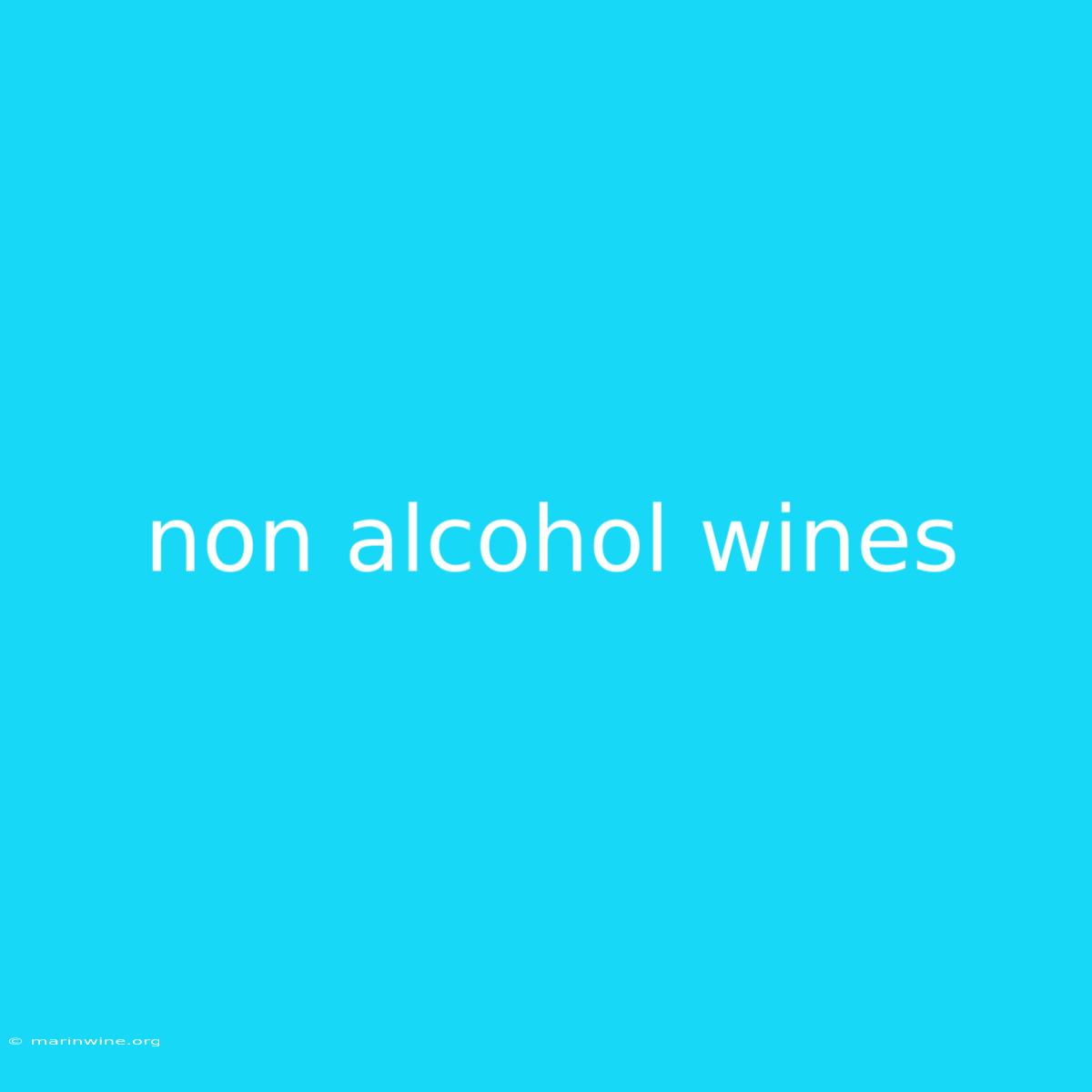Uncorking the Secrets: A Dive into the World of Non-Alcoholic Wines
Have you ever craved the taste of wine but wanted to avoid the alcohol? This is where non-alcoholic wines come in! These innovative beverages offer the complex flavors and aromas of traditional wines without the intoxicating effects.
Why It Matters: The demand for non-alcoholic alternatives is booming, with people seeking healthier options, mindful drinking choices, and exciting new flavors. This article explores the fascinating world of non-alcoholic wines, exploring their production methods, tasting profiles, and growing popularity.
Key Takeaways of Non-Alcoholic Wines:
| Key Takeaway | Description |
|---|---|
| Growing Popularity: Non-alcoholic wines are experiencing a surge in demand, appealing to a wide range of consumers. | |
| Diverse Flavors: A wide array of styles, from crisp whites to rich reds, offer an exciting palette of taste experiences. | |
| Healthier Choice: Enjoy the taste of wine without the alcohol content, making it suitable for various lifestyles. | |
| Social Inclusion: Allows individuals to participate in social gatherings and enjoy wine with friends without consuming alcohol. |
What are Non-Alcoholic Wines?
Non-alcoholic wines are crafted to mimic the taste and aroma of traditional wines while removing the alcohol content. This is achieved through various methods, including:
1. Reverse Osmosis: A physical separation process uses a membrane to filter out alcohol molecules, leaving the remaining wine components intact.
2. Vacuum Distillation: This method involves heating the wine under reduced pressure, causing alcohol to evaporate and be collected separately.
3. Early Fermentation: Stopping fermentation before the conversion of sugars to alcohol results in a wine with lower alcohol content.
4. Dealcoholisation Techniques: These techniques employ specific processes to remove alcohol after fermentation, leaving the remaining wine components intact.
The Delicate Art of Flavor Creation
Non-alcoholic winemakers face the unique challenge of preserving the complex flavor profiles of traditional wines without the presence of alcohol. This requires meticulous attention to:
1. Grape Variety Selection: Choosing specific grape varieties known for their aroma and flavor contributes significantly to the final product.
2. Winemaking Techniques: Fermentation, oak aging, and other traditional winemaking practices play crucial roles in developing the desired taste and texture.
3. Blending: Careful blending of different wines allows winemakers to achieve a balanced and complex flavor profile, mimicking the complexity of traditional wines.
Exploring the World of Non-Alcoholic Wine Styles
The world of non-alcoholic wines is vast and exciting, offering a diverse range of styles to satisfy every palate:
1. White Wines: Discover refreshing crispness in non-alcoholic versions of Sauvignon Blanc, Pinot Grigio, and Chardonnay.
2. Red Wines: Experience bold flavors and tannins in non-alcoholic expressions of Merlot, Cabernet Sauvignon, and Pinot Noir.
3. Rosé Wines: Enjoy the delicate balance of fruit and freshness in non-alcoholic rosé wines, perfect for warmer weather.
4. Sparkling Wines: Indulge in the celebratory sparkle of non-alcoholic versions of Champagne and Prosecco.
Frequently Asked Questions:
Q: Are non-alcoholic wines healthy?
A: Non-alcoholic wines generally contain fewer calories and sugar than traditional wines, making them a healthier option for those seeking to reduce their alcohol intake. However, always check the nutritional information on the label, as different brands vary in their sugar and calorie content.
Q: Do non-alcoholic wines taste like traditional wine?
A: Non-alcoholic wines strive to replicate the complex flavors and aromas of their traditional counterparts, but some nuances may differ due to the removal of alcohol.
Q: Can I find non-alcoholic wines in my local supermarket?
A: The availability of non-alcoholic wines is growing, but it may depend on your location. Check your local supermarket, wine shops, and online retailers for a wide selection.
Q: How long can I store non-alcoholic wine?
A: Non-alcoholic wines have a shorter shelf life compared to traditional wines. Store them in a cool, dark place, and refer to the label for specific storage recommendations.
Tips for Enjoying Non-Alcoholic Wines:
-
Chill White Wines: Serve white non-alcoholic wines chilled for a refreshing experience.
-
Pair with Food: Experiment with pairing non-alcoholic wines with various dishes to enhance the flavors.
-
Serve with Ice: Consider serving non-alcoholic wines on ice for a cooler and more refreshing experience.
-
Use in Cocktails: Explore using non-alcoholic wines as a base for mocktails and low-alcohol cocktails.
-
Explore Different Styles: Don't be afraid to experiment with different non-alcoholic wine styles to discover your favorites.
Summary by Non-Alcoholic Wines
Non-alcoholic wines offer a delicious and innovative way to enjoy the complexities of wine without the alcohol content. This evolving category is driven by a growing demand for healthier choices, mindful drinking, and exciting flavor profiles. As the demand for non-alcoholic wines continues to rise, we can expect to see even more exciting innovations and delicious options in the years to come.
Closing Message: Enjoy the taste of wine without the alcohol! Explore the world of non-alcoholic wines and discover a new realm of flavor and refreshment.

